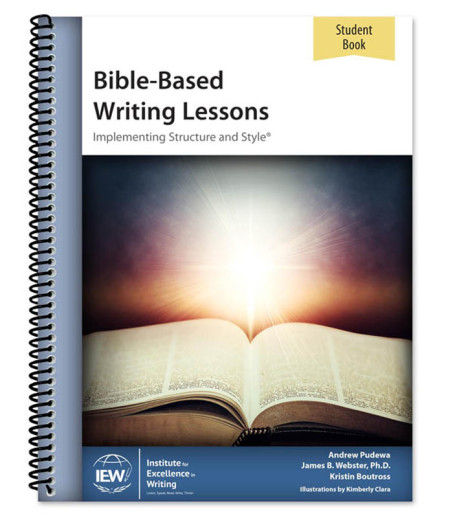We use cookies to make your experience better. To comply with the new e-Privacy directive, we need to ask for your consent to set the cookies. Learn more.
Bible-Based Writing Lessons Student Book
This program can be used for Levels A, B or C. 30 lessons are included in a spiral-bound book with ready-made lesson plans, Scripture used as a subject for writing, and multi-level checklists. Each lesson provides a specific objective, at least two translations of Scripture, an assignment with checklists, and a space for the final copy to be written or pasted into the book, which creates a portfolio of the year's work. Checklists are provided for the three different levels. Sample compositions are plentiful, as well as vocabulary development and review exercises to strengthen understanding of stylistic techniques. The story of Noah forms the core of the first two units. Unit 3 focuses on sequencing and sources include the miracle at Cana, the parable of the talents, the story of Jonah, the Good Samaritan, and the Prodigal Son. Unit 4 lessons have students read and summarize Paul on Charity, Jesus' Miracles, Christ's Last Words, along with stylistic exercises taken from Psalms. Custom pictures have been created for Unit 5 lessons (Esther, Daniel, Nativity, Paul's conversion), and Unit 6 uses the synoptic gospels to teach multiple reference summarizing. With Unit 7, a few creative writing opportunities are suggested, and Unit 8 continues the five paragraph model with essays on Job's suffering, Christ's condemnation by Pilate, and the duties of a Christian. Unit 9 presents an analysis of the books of Ruth and Jonah, as well as the story of David and Goliath.
This collection of writing lessons provides an incredible opportunity to increase your students' understanding of Scripture as they improve their writing abilities. Working through all of IEW's nine units—and beyond, these writing lessons use actual passages from Scripture as source texts.
This Student Book includes assignments, blank outlines, source texts, checklists, and vocabulary cards.
This book is designed to be used by an instructor who has been through or is currently viewing the Teaching Writing: Structure and Style video course.
This theme-based writing curriculum offers a full year of instruction for students with previous IEW experience and reading comprehension at grades 6–8+. Includes vocabulary cards, literature suggestions, and access to helpful PDF downloads.
Note: The Student Resource Packet is a necessary component of this course. This supplemental resource is included with your purchase as an e-book for you to download and print, or you may purchase it printed with a binder here. (If you did not place your order online through our website, please check the copyright page for download information.)
Based on specific topics or on events in history, these sets of writing lessons (same grade-range levels as the SSS) offer comprehensive, almost scripted instruction. All necessary source texts have been developed for busy parents and teachers like you. An IEW veteran and aficionado myself, I couldn't conceive of anything more complete than what is provided here. Each lesson offers comprehensive (just short of totally scripted) instruction. All necessary source texts are provided and are reproducible for one parent/one homeschool. Clear assignments (sometimes differentiated between levels) along with a checklist to aid both the student in preparation and the parent in grading. These are also designed to be used by the student to work on throughout the week. Based on specific topics or events in various segments of history, the lessons include grammar exercises, vocabulary development, quizzes, and games for review and reinforcement - along with the writing instruction, of course.
In all lessons students are encouraged to polish their final draft perhaps even adding illustrations. At the end of each course the student will have a personal portfolio collection of poems, stories, reports, essays and research papers. Lessons are taught at the beginning of each week allowing the rest of the week for students to complete the assignment which they should be able to do on their own. Teacher preparation is minimal. (Do I hear an emphatic "Yes!"?)
The courses are targeting a progressively more competent student with the assumption that students are working through the courses according to suggested grade levels. Therefore, there is an increasing complexity to the instructions, expectations, and assignments. Accordingly, teachers are encouraged to be flexible with plans. The beginning writer may need to spend more than the suggested week on difficult lessons or omit some of the grammar. Mature students may move more quickly to allow time for additional research writing and/or more creative essay writing.
Many of these courses can be used equally well within a homeschool with several different aged students and all can be used in a co-op/support school setting with more grade-specific groupings of students. It's assumed that parents/teachers have completed Teaching Writing Structure & Style (TWSS), IEW's DVD seminar for parents and teachers.
Some courses have both a Teacher and a Student Book. In these courses, instruction for the teacher is more extensive and both books are necessary as the course is designed to be interactive between the teacher and student. Teachers should plan to read over the lessons with the students and help as necessary, especially with outlining and brainstorming. A roll of tickets (available at office supply stores) is optional but very useful for encouragement and motivation. ~ Janice
| Product Format: | Softcover Book |
|---|---|
| Brand: | Institute for Excellence in Writing |
| Grades: | 6-12 |
| ISBN: | 9781623413156 |
| Length in Inches: | 11 |
| Width in Inches: | 9 |
| Height in Inches: | 1 |
| Weight in Pounds: | 2.15 |

